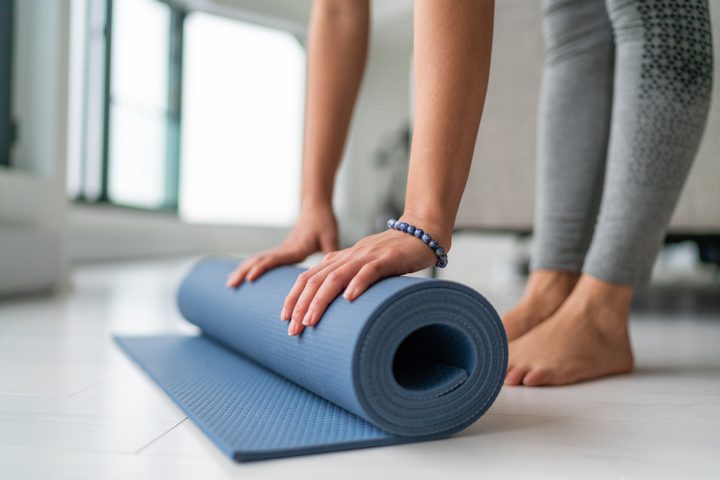
Highlight: Recreation Therapist Emily Mattimoe discusses how leisure and recreational activities can be used as coping mechanisms
Yoga is often a hands-on experience between a teacher and a practitioner.
This interaction is a primary advantage to working with an instructor privately or in a class, rather than following a DVD or online session.
For someone recovering from trauma, learning to reconnect with emotion is often frightening. Practicing yoga with people who understand can be one of many powerful tools to do this safely. Emily Mattimoe, MS, CTRS, is the coordinator of recreation therapy services at Cottonwood Tucson. In her work, she explores how leisure and recreational activities can be used as coping mechanisms. When asked in an interview about how yoga helps people move through various forms of trauma, she said it’s a form of “participatory medicine.”
“Many times, we don’t want to feel emotions, or we don’t want to experience what’s happening in our bodies because it’s so painful. So, what happens is people hold those emotions or trauma in their bodies,” Mattimoe says. “It’s our job as professionals to really help them move all of that through their bodies, then bring some language to it. Afterward, when they feel safe, start touching on those pieces that might be stuffed down.”
Using yoga to help heal is rather common now as more people discover the multiple benefits of a regular practice. Many people turn to it as a coping mechanism, for injury recovery, as a therapeutic release, or to reestablish a loving relationship between mind, body, and spirit. Yoga introduces people to many concepts, including:
- Breathing techniques to help prompt calmness and manage anxiety
- Mindfulness both on the mat and in life
- Body acceptance and the interconnectedness of mental and physical states
- Learning how to create a sacred space
- How being in a present moment differs from dwelling on the past or worrying about the future
Take Ownership of Your Space
You and your yoga teacher should form a trusting, collaborative relationship. This is sometimes difficult to do in a group-class setting, so if your instructor doesn’t do a private intake with you, ask if you can have a few minutes after class to talk about certain issues. The majority of instructors welcome this opportunity to learn more about you.
You don’t have to discuss anything in great detail, if that’s not your way. But it’s important for your teacher to know key health aspects and how they influence your practice. For example, it might be challenging for someone with lumbar spine disc issues to extend fully forward while bending at the waist. A teacher needs to know about this condition to offer the right modification for that person to avoid injury. Any mental, emotional, or physical issues that present for you in a particular moment are essential for your teacher to understand.
In some circumstances, your instructor might be a mental health counselor, but not likely. He or she might be certified specifically in trauma-sensitive or trauma-informed yoga, but not always. Consequently, an instructor might not initially understand what’s happening for you during practice until you speak up, so your extension of trust is vital for creating the right atmosphere for your practice.
Recognize and embrace the ownership you have and start a conversation about:
- What makes you feel comfortable
- How you want to be approached
- If adjustments or assists are fine
- Whether or not you feel comfortable closing your eyes
- If certain poses prompt particular feelings and if so, what alternatives are better
- Other aspects of practice that give you the power of choice
You Don’t Need to Compromise
Once you express your needs, the yoga teacher should ideally respond with something to the effect of “How can I help you have a safe and enjoyable experience?” If that doesn’t happen, find another instructor. There’s no need to compromise.
Here’s the tricky bit: as you’re evolving through the healing process, you might not have any idea that an instructor walking behind your mat makes you uncomfortable; or that opening your knees into a Wide-Angled Seated Forward Bend triggers negative emotions. It’s unsettling to encounter a situation for the first time and not realize it prompts a reaction.
If this happens, simply move into a position that allows you to feel safe and centered, and focus on your breath. A compassionate teacher will recognize that you’re taking essential time to regroup. After class, the two of you can consider any necessary modifications.
The Power in Permission
In many trauma-informed yoga classes, an instructor offers invitations to move into postures, to open or close eyes, to allow touch for an adjustment or an assist, and so on. In other trauma-sensitive yoga classes, the guidelines are much more exact. Some aspects, such as closing your eyes or touching by an instructor, aren’t permitted at all.
If you feel you’d be much more comfortable in these types of classes, here are some ways to find them:
You can also consult with hospitals, treatment facilities, and mental health experts to find a trauma-informed class or instructor in your area.
Other yoga classes that support healing from various types of trauma include:
- Eat, Breathe, Thrive, which fosters positive body image and overcoming eating disorders
- Mindful Yoga Therapy for Veterans, a program designed to help veterans and their families cope with PTSD
- Yoga of 12-Step Recovery, to support individuals in addiction recovery and relapse prevention
Remember: you’re in control of your yoga practice. You always have permission to allow or deny certain aspects to accompany your experience.
Whole Healing at Cottonwood Tucson
In addition to alternative mind-body therapies such as yoga, EMDR, and equine therapy, Cottonwood Tucson’s integrated focus on mental health and substance use disorders also includes using somatic experiencing as a modality for processing and understanding trauma. Each person who comes to our facility for care receives individualized attention best suited for their most effective healing.






